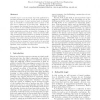Free Online Productivity Tools
i2Speak
i2Symbol
i2OCR
iTex2Img
iWeb2Print
iWeb2Shot
i2Type
iPdf2Split
iPdf2Merge
i2Bopomofo
i2Arabic
i2Style
i2Image
i2PDF
iLatex2Rtf
Sci2ools
114
click to vote
ADC
2003
Springer
2003
Springer
An algorithm for the induction of defeasible logic theories from databases
Defeasible logic is a non-monotonic logic with applications in rule-based domains such as law. To ease the development and improve the accuracy of expert systems based on defeasible logic, it is desirable to automatically induce a theory of the logic from a training set of precedent data. Empirical evidence suggests that minimal theories that describe the training set tend to be more faithful representations of reality. We show via transformation from the hitting set problem that this global minimization problem is intractable, belonging to the class of NP optimisation problems. Given the inherent difficulty of finding the optimal solution, we instead use heuristics and demonstrate that a best-first, greedy, branch and bound algorithm can be used to find good theories in short time. This approach displays significant improvements in both accuracy and theory size as compared to recent work in the area that post-processed the output of an Apriori association rule-mining algorithm, w...
Related Content
| Added | 06 Jul 2010 |
| Updated | 06 Jul 2010 |
| Type | Conference |
| Year | 2003 |
| Where | ADC |
| Authors | Benjamin Johnston, Guido Governatori |
Comments (0)

